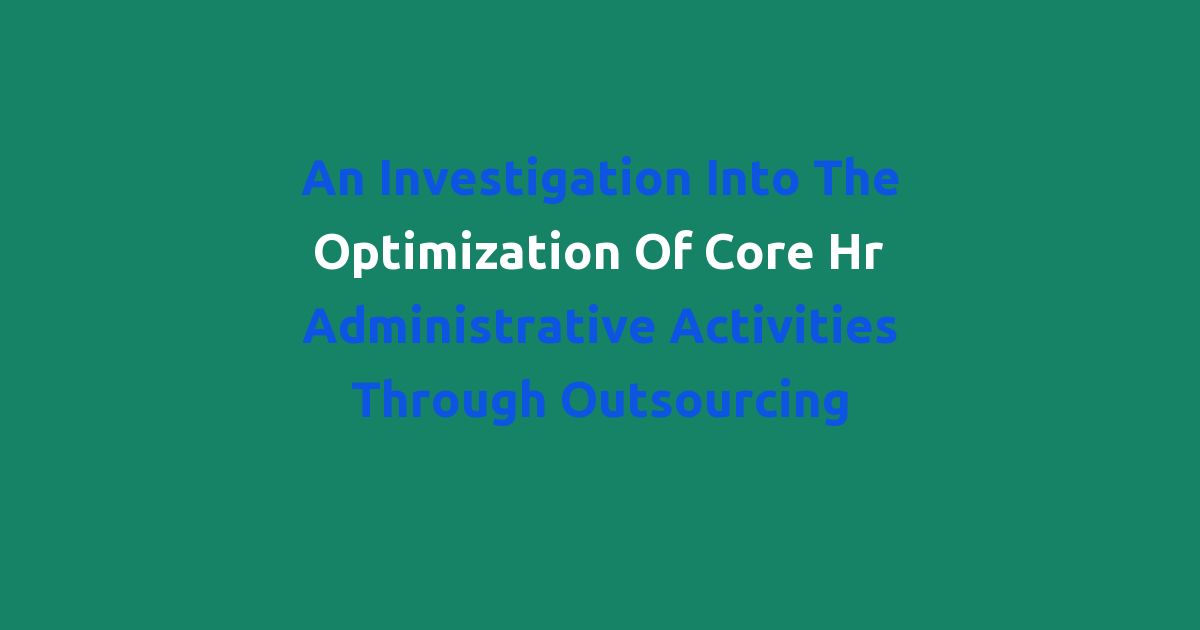A study on improving core HR administrative functions through outsourcing.
Investigation into the Optimization of Core HR Administrative Activities through Outsourcing
Introduction
As businesses evolve in this fast-paced world, the need to optimize core HR administrative activities becomes more crucial than ever. Human Resource (HR) functions such as payroll management, benefits administration, recruitment, and compliance with employment laws are essential for the smooth functioning of any organization. However, managing these tasks in-house can be time-consuming, costly, and inefficient. Outsourcing HR administrative activities to third-party service providers can offer numerous benefits, such as cost savings, improved efficiency, access to specialized expertise, and enhanced compliance with regulations.
Problem Statement
The traditional method of managing HR administrative activities in-house can pose several challenges for organizations. These challenges include high operational costs, lack of specialized expertise, time-consuming manual processes, and difficulty in keeping up with changing labor laws and regulations. As a result, there is a growing need for organizations to explore outsourcing as a strategic solution to optimize their HR functions and drive business growth.
Existing System
In the existing system, organizations typically manage HR administrative activities in-house using their own resources. This approach requires considerable investment in terms of hiring HR professionals, setting up HR systems and processes, and ensuring compliance with various regulations. However, this traditional method can be costly, time-consuming, and inefficient, especially for small and medium-sized businesses with limited resources.
Disadvantages
There are several disadvantages associated with the traditional in-house management of HR administrative activities. These disadvantages include:
1. High operational costs: Managing HR functions in-house can be expensive due to the need to hire and retain HR professionals, invest in HR technology, and allocate resources to HR tasks.
2. Lack of specialized expertise: In-house HR teams may lack the specialized knowledge and skills required to handle complex HR administrative activities effectively.
3. Time-consuming manual processes: Inefficient manual processes can lead to errors, delays, and increased administrative burden for HR teams.
4. Compliance risks: Keeping up with changing labor laws and regulations can be challenging for in-house HR teams, leading to compliance risks and potential legal issues.
Proposed System
To address the challenges associated with the existing system, the proposed system involves outsourcing core HR administrative activities to third-party service providers. By leveraging the expertise and resources of HR outsourcing companies, organizations can optimize their HR functions and enhance operational efficiency. The proposed system includes the following key components:
1. Payroll management: Outsourcing payroll processing can help organizations streamline financial transactions, ensure accurate payments to employees, and comply with tax regulations.
2. Benefits administration: Outsourcing benefits management can improve employee satisfaction, reduce administrative burden, and enhance compliance with benefit laws.
3. Recruitment: Outsourcing recruitment processes can help organizations attract top talent, reduce hiring costs, and accelerate the hiring cycle.
4. Compliance management: Outsourcing compliance activities can help organizations stay up-to-date with labor laws, minimize legal risks, and ensure a safe work environment for employees.
Advantages
There are several advantages to outsourcing core HR administrative activities:
1. Cost savings: Outsourcing HR functions can help organizations reduce operational costs by eliminating the need for hiring and training HR professionals, investing in HR technology, and maintaining HR systems.
2. Improved efficiency: Outsourcing HR activities to specialized service providers can streamline processes, reduce errors, and increase productivity.
3. Access to specialized expertise: HR outsourcing companies have the knowledge and skills to handle complex HR tasks effectively, leading to better outcomes for organizations.
4. Enhanced compliance: Outsourcing compliance management can help organizations stay compliant with labor laws and regulations, minimizing legal risks and penalties.
Features
The proposed system for outsourcing core HR administrative activities includes the following key features:
1. Customized solutions: HR outsourcing companies offer tailored services to meet the unique needs of each organization, ensuring maximum efficiency and effectiveness.
2. Scalability: Outsourcing allows organizations to scale HR activities up or down based on changing business needs, providing flexibility and cost savings.
3. Technology integration: HR outsourcing companies leverage state-of-the-art technology to streamline processes, improve data accuracy, and enhance reporting capabilities.
4. Risk management: Outsourcing compliance activities can help organizations mitigate legal risks, protect employee rights, and maintain a positive workplace culture.
Conclusion
In conclusion, the optimization of core HR administrative activities through outsourcing presents a strategic opportunity for organizations to improve efficiency, reduce costs, and enhance compliance with regulations. By leveraging the expertise and resources of HR outsourcing companies, organizations can focus on their core business activities while outsourcing non-core HR functions to specialized service providers. The proposed system offers numerous advantages, such as cost savings, improved efficiency, access to specialized expertise, and enhanced compliance with regulations. Overall, outsourcing core HR administrative activities is a viable solution for organizations seeking to drive business growth and achieve long-term success in today’s competitive market.

